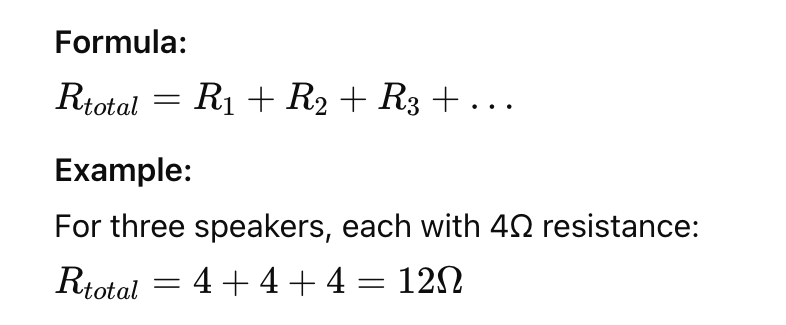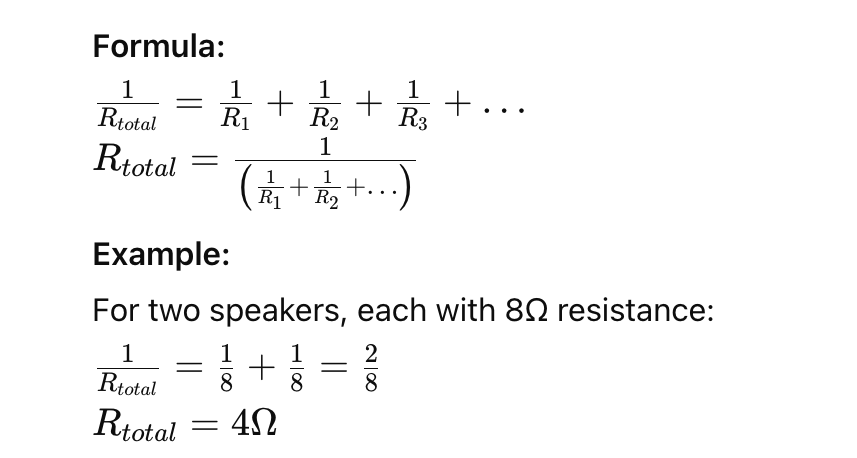Are you a technician or an audio enthusiast looking to calculate the resistance of multiple speakers to hook them up together? If yes, you are right here as I have done the hard work for you and provided you with a simple calculator. You can just insert the values of individual speakers for any type of wiring (series, parallel, or series-parallel) and get the total value calculated in seconds.
So what are you waiting for? Just get started below.
Understanding Speaker Resistance and Wiring Methods
When designing small or large audio systems, resistance plays an important role and helps you in determining the compatibility of speakers and the amplifier.
That’s why I have explained resistance and wiring methods in detail. Stay tuned till the end and you will understand every little concept.
What is Speaker Resistance?
Speaker resistance is the DC resistance of a speaker’s voice coil. It is different from impedance which is resistance to the alternating current signals like audio. It is a static value and very important for better audio setups and safety of the equipment.
Speaker Wiring Methods
The total resistance of the audio system can be changed by changing the wiring methods. Choosing the right wiring method is crucial to establishing a safe connection between the amplifier and speakers.
1. Series Wiring
Speakers are connected in a sequence and the current flows from one speaker to the other. In simple words “+” terminal of one speaker is connected to the “-” terminal of the next speaker and so on.

This wiring type increases total resistance and the amplifier can’t deliver much power.
2. Parallel Wiring
In this wiring method, all “+” terminals are combined on one side, and all “-” terminals are combined on the other side. It results in 2 terminals (+ and -) which can be connected to the amplifier.

Parallel wiring decreases total resistance which allows the amplifier to deliver more power.
3. Series-Parallel Wiring
The combination of series and parallel wirings is commonly used for larger setups. It provides more flexibility and helps to control the output resistance.
Below are the three steps to do it:
- Group speakers into parallel sets
- Calculate resistance for each set
- Add the series resistance of the groups.
Example:
For four speakers (8Ω each), grouped into two parallel pairs:

Why does Resistance Matter?
For a safe connection between the speakers and the amplifier, it is necessary to match the resistance. If resistance is not matched it may cause:
- Amplifier overheating
- Damage to the speakers
- Audio distortion
Measuring Speaker Resistance with a Multimeter
If you are not sure about the resistance of one or more speakers in the setup, you can find it using a multimeter. Here’s how to do it:
- Disconnect the speaker from the amplifier.
- Set the multimeter to the Ohms setting.
- Place the probes on the speaker terminals
- It will give you an estimated resistance. It will be slightly less than the actual. For example, if it shows 3.5 then it is 4 Ohms speaker.
Difference Between Resistance and Impedance
While both resistance and impedance refer to the opposition of electrical current, they are different concepts in audio systems. Resistance measures the DC opposition to current while impedance measures AC resistance like in audio.
Resistance is often referred to as a “static” value. Impedance takes into account both resistance and reactance (which varies with frequency) making it a dynamic measurement.
So, if you are designing an audio system, then you may want to know the total resistance of speakers or total impedance of speakers. Both of these concepts look similar but they are different.
If you’re also looking to calculate the impedance of your speaker setup, we have a separate tool that focuses on impedance calculations. You can check it out here: Speaker Impedance Calculator.